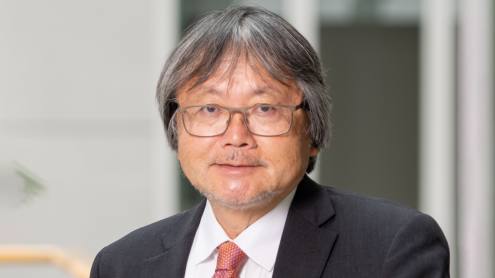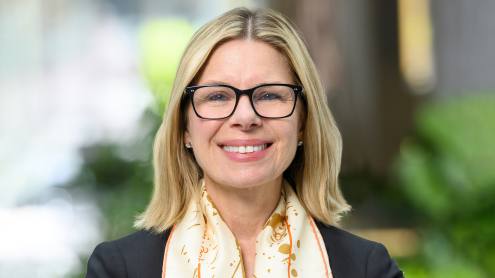THE PARTICIPANTS
|
| Erastus AkinbolaChief executive of Intercontinental Bank, and president of the Chartered Institute of Bankers in Nigeria |
|
| Charlie Corbett Economics editor, The Banker |
IN THESE UNCERTAIN TIMES, IS INTERCONTINENTAL BANK REVISING ITS PROFIT FORECASTS FOR NEXT YEAR?
We are not revising our profit forecasts but we might not be able to talk of 100% growth that we’ve always recorded right from the inception of the bank. I think we are facing reality – that [growth] will not be there this year.
WHAT IMPACT HAS THE GLOBAL CRISIS IN LIQUIDITY HAD ON INTERCONTINENTAL BANK?
Intercontinental Bank and the rest of the [Nigerian] banking industry is not directly affected by what is happening in the West, for the simple reason that the [financial] products that caused the problems were not sold in Africa. For the first time, isolation paid off for Africa.
But having said that, there is no doubt that if our partners in business are having problems, eventually it will have some effect on us. There are two effects: one, the credit lines have reduced; two, the stock markets in Nigeria have lost a lot of value.
WHAT DO YOU THINK WILL BE THE BIGGEST GROWTH AREA FOR THE BANK NEXT YEAR?
I think we’ve made up our minds that, for the next five years, most of our money will come from [inside] Nigeria. As a result, we are continuing with our strategy of growing our number of branches. Retail banking will take the forefront of our business. We [also] plan to improve our foreign exchange services to be compatible to what we have in the Western world.
WHAT SORT OF CRITERIA DO YOU USE BEFORE YOU LEND TO SOMEONE?
We ask ourselves: are they employed by a reputable organisation and can the organisation vouch for them? If they are not, maybe they are an artisan; do they belong to a co-operative? Can the co-operative identify this person?
If they do not belong to a co-operative, can the clan head or his village head say “I know this person.”? Because the one thing that works very well in Nigeria is what we call peer pressure. If you belong to a co-operative, they are always warning their colleagues “pay back your loans so the others will benefit”.
DO YOU PLAN TO RAISE ANY MORE MONEY ON THE INTERNATIONAL CAPITAL MARKETS?
I don’t think this is the right time to go out [to international investors]. But banks can give us one-year money, especially bearing in mind the interest they can earn in Africa that they can’t get here [in London]. You can still give money to an African bank and get 9%. Nobody will pay you that here. So, such funds will keep coming to Africa.
But [when it comes to] public offers [of shares], I think that’s on the back burner. I don’t see that happening in the next three years.
HOW SHELTERED IS THE NIGERIAN BANKING INDUSTRY FROM the CREDIT CRUNCH?
We were very lucky in Nigeria because in 2004, Governor [Chukwuma] Soludo of the Central Bank compelled banks to shore up their capital [to N25bn ($181.4m)]. When this credit crunch came, because [Nigerian banks] had such huge capital bases, there was a safety net to fall into, so this has saved banks in the industry.
DO YOU FORESEE FURTHER CONSOLIDATION IN THE BANKING SECTOR?
As I have always told people, merger and acquisition is not an African [phrase]. If Governor Soludo had not forced mergers on banks in 2004, we would still have 89 banks today [rather than 24]. There is an ‘I can do it’ [attitude] in Nigeria. Even a bank that is almost down believes, with a little effort, it can still come back to life. So people will not look for help, or who to merge with. If you approach any bank today, the chances are they will tell you: “I don’t want to merge.”
SO IT IS A CULTURAL THING?
I want to believe it is an African thing. It is cultural. People just believe: “I am strong enough in my own house, so why shall I allow someone else to take me over?”
WHAT WOULD YOU SAY TO SHAREHOLDERS TO REASSURE THEM DURING THESE UNCERTAIN TIMES?
This is the time to hold on to your shares because right now the losses are paper losses. It is only when you sell that [the loss] crystallises. Number two: the fundamentals of the banks are still very strong. The banks are still paying huge dividends. This is time for the Nigerian shareholder to wait it out.
HAS THE STOCK MARKET SUFFERED FROM ‘HOT MONEY’, WHICH HAS NOW LEFT?
Yes. The foreign investors, who are more or less speculators, have taken their profits and disappeared. Some of them had problems [of their own] and needed to sell their stock as distressed cargo, and run away quickly. Some speculators wanted to move money to real estate. They’ve done all that, and then little by little, money is coming back from real estate and into the stock market. I want to believe we have reached the bottom.
HAS NIGERIA MOVED AWAY FROM A BOOM AND BUST CULTURE?
For the Nigerian public, this is the first time they have come to the stock market to buy. The labourer, the gardener... everybody bought stock and they never believed that it could go down. It was like picking up money on the road, they couldn’t believe it. Then suddenly [when the market fell] they saw the money slip through their fingers. It was a rude shock but I’ve been telling them that this is the nature of stock markets. You only lose this money if you sell in a hurry.
WHAT MORE CAN THE NIGERIAN GOVERNMENT DO TO STIMULATE THE SECTOR?
What the banking sector needs from government is reassurance. For example, right now, [Nigerian bank] deposits are only insured up to about N250,000. That is very low, especially for the big depositor. The government needs to shore up that amount to give depositors more confidence. Number two: government policies still need to be consistent so that we can plan over a long-term period. If policies keep changing, then people will not have confidence; they will be playing short term, which is the bane of the Nigerian economy.
WHAT KIND OF IMPACT IS THE OIL PRICE SLUMP GOING TO HAVE ON THE ECONOMY IN NIGERIA?
Let me first say that before the collapse of the oil market, we had a lot of money going into our [foreign currency] reserves, so the rate at which we build up our reserves is going to slow down. That is very clear. Second, there’s what we call excess crude funds that are shared by state governors. Excess crude is the difference between the budgeted figure [for the price of oil] and what the oil market is. States then share this for development. Now that the price has slumped, that will disappear. So that will affect development.
WHAT OPPORTUNITIES ARE THERE FOR THERE FOR AFRICA AS A RESULT OF THE CREDIT CRUNCH IN THE WEST?
What African governments need to do is reassure investors that the environment is safe, that the change of government will be orderly, that whoever puts money in can take it out as easily as it came in, and that the fundamentals of the economy will be guarded and protected. If we can sort out our politics and governance in Africa, a lot of funds will come in.
WHAT IS THE KEY TO CHANGING AFRICA’S IMAGE ACROSS THE REST OF THE WORLD?
I think the key is for Africa to find a way, among the African Union, to say that, look, just like you have [in the US] after eight years, no matter how good you are as a president, you just need to go, and give somebody else a chance.
You can see what happened in Kenya and Zimbabwe so we just want to say: “No matter how good you have been, after eight years let somebody else try.”
If Africans can adopt this as an article in the African Union it would ease a lot of tension.
IF THERE WAS ONE CHANGE THAT WOULD PROPEL NIGERIA ONTO THE INTERNATIONAL STAGE, WHAT WOULD THAT BE?
Rather than creating personalities, create institutions that will be guardians of society. I think when that happens in Africa, the economy will boom. We have all the ingredients for growth, for rapid development in Africa, [however] we need to sort out governance.
This interview is sponsored by Intercontinental Bank but independently edited by The Banker.













